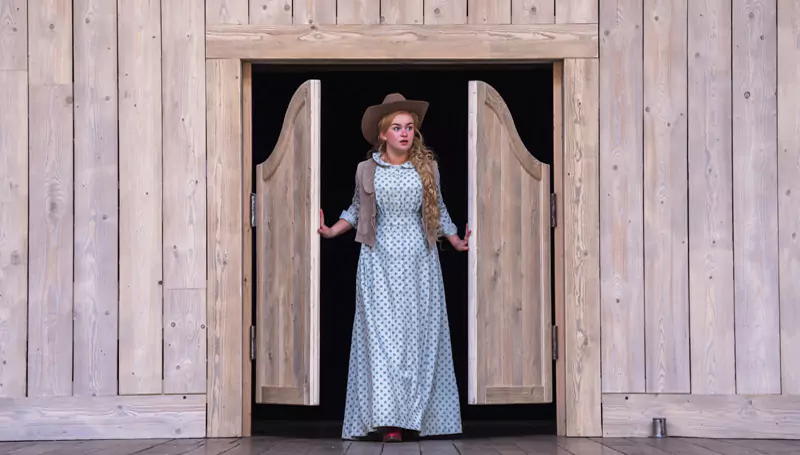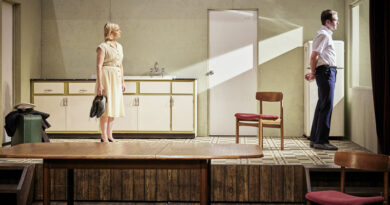“Romeo and Juliet” at Globe Theatre
Simon Jenner on the South Bank
3 May 2025
“Draw.” That word, used more than once by Shakespeare, seems to have inspired director Sean Holmes to turn Romeo and Juliet into Calamity Jane meets The Only Way Is Essex meets The Ghost Sonata. With the RSC’s magnificent Cowbois still ringing like a gunshot in his ears, assistant artistic director Holmes opens the Globe’s summer season with a fiery-footed production of Shakespeare’s stirring tale of youthful romance.

Lola Shalam and Rawaed Asde.
Photo credit: Tristram Kenton.
It is, unusually, very funny. A decidedly comedic Juliet (Lola Shalam) and gawky Romeo (Rawaed Asde) seem less star-crossed than cross in this one-star town, itself worn by the Prince of Sheriffs. But there’s far more to this three-hour traffic, cut down only in its last act with twirling details and household bustlings to prepare feasts.
Paul Wills’s simple set of off-white boasts swing-doors and sports a balcony mainly used by musicians whose doors open and shut with aplomb. There’s two uses of a moving platform where Juliet is brought on in a separate balcony, and a bed. Grant Olding’s music shifts from ragtime and polkas, to parlour songs and dance music. There’s a side-splitting burst as the quintet blow doors open for Paris (a white-hatted fop in Joe Reynolds’s preening performance) to perform his wedding music, snapped off by tragedy. And there’s the rub: this production undercuts tragedy with belly laughs.
Accents are all over the continents. Whilst Colm Gormley’s Lord Capulet is Irish paterfamilias which works in the West of the 1880s, Shalam as his daughter Juliet swerves between Estuary and Essex. Superb when angry, she’s also at her most serious there too. There’s a stunning moment when she rounds on Nurse (Jamie-Rose Monk, one of the stand-out performances): “Shall I speak ill of him that is my husband?” Shalam’s ferocity, under the mien of a 13-year-old girl, resounds with desperation. Equally, Asde’s Romeo mixes haste and calf love with wild acts. Wishing to keep the peace with Tybalt, by the end he’s trigger-hapless.
It’s a bonus having such young actors in lead roles. Elsewhere too Holmes suggests these two are too young to know the language of love, and Asde actually resorts to reading out some particularly flowery lines. It underscores their youth, awkwardness, and sheer impetuosity. And that infects the whole Wild West society. Gormley’s Capulet moves from suggesting two years’ wait to marry Juliet, to three days. Lady Caplet (Léa de Garets) moves in a stately costume and speaks like that; though here there’s no coercive bullying in this marriage, as with some. It’s a dynamic rather lost.

Photo credit: Tristram Kenton.
Mercutio (Michael Elcock) is fantastical. He’s a green-suited dandy who can pirouette and lead magnificent dances (Tamsin Hurtado-Clarke’s movement is riotously good), primp and speak verses as if plucking flowers or a stiletto. He acts like he attended an Oscar Wilde Midwest lecture. His poise in the Queen Mab speech is more than breathtaking since he seems making it up on the spot: breathing out, repeating key words before he tacks to more wild bearings. Benvolio (Roman Asde) also doubling as Chorus plays against him in a winning youthful sorrow, full of care. He seemingly owns no romantic feelings beyond being the one survivor of his peer group.
It’s good that Tybalt (Callum Callaghan), though not a blood relative of Capulet (by marriage only, technically Lady Caplet’s rather older nephew), also drawls a light, deadly controlled Irish. It breaks against Capulet where their stand-off exchange is one of the early highlights. Beyond the West, one is reminded of contemporary Irish gangland thrillers, and Callaghan’s tread and ferocity. Maisie Carter produces some superbly extended fight direction here.
Late arriving, John Lightbody’s Friar Lawrence speaks in received pronunciation and carries the greatest authority on stage. Everything he says and does is calibrated to respond or initiate. He can occasionally fly into rages, as with the undelivered letters. His clarity – and overall vocal clarity in this production is excellent – is mesmerizing. Each time he speaks you’re drawn to him alone.
With Lightbody and the truly mercurial Elcock, Monk’s skirling and cajoling is the most assured performance on stage. Partly it’s because these roles are played relatively straight, though Elcock’s role is wonderfully rethought. The actors draw on tradition but also their way of thinking through every line. I’ve never seen Mercutio and Nurse in direct antithesis as here: but it reminds us that in one sense, they’re kin.
There’s some tensions missing. The Capulets’ marriage, Paris’ coercion of Juliet in the cell, which here seems simple entitlement, homoerotic currents in Benvolio. Marcus Adoplhy’s Montague enters with a princely presence wholly different to Capulet’s rough Frontier bonhomie, and in his relatively few lines he establishes a class difference and containment, so you see where Romeo proceeds from and might end; if his impetuosity doesn’t hobble him.
Increasingly though Act Five is slimmed down to dumb show, and Adolphy’s Apothecary role is silent and ritualized. As are deaths throughout, with actors taking up the four chairs upstage. As with Robert Icke’s Almeida Hamlet of 2017 featuring Andrew Scott, the living gently exchange words with the dead: it happens with Mercutio, Paris, the lovers, even Tybalt though he remains silent. But this is inspired: one especially at the end where all the dead dance out with Juliet as she lies asleep in her tomb (those seats), and one final use truly worth seeing. These moments seem physically weightless, as the music drifts down. Yet they invest tragic futility with the gravity that lands the levity; deaths are agonized and prolonged to underscore this. Only Lightbody stands aloof.
It’s a production where delight is in discovery, especially in the supporting cast. Shalam though is a singular Juliet, and Asde’s Romeo touches fire in his own star-defying outbursts. Exuberant, exquisitely detailed and memorable, this production doesn’t inhabit the Wild West at all; but a dream of it in a couple of adolescent heads. A pair who connect in sparks of recognition, in a world gone mad north-north-west.









